Efficiency of Hong Kong Competition Law Without Private Enforcement
VerifiedAdded on 2022/08/08
|39
|11307
|237
Essay
AI Summary
This essay delves into the complexities of competition law in Hong Kong, specifically addressing the question of whether the region can maintain an efficient policing of competition law without private enforcement. It begins with a comprehensive introduction, outlining the background of Hong Kong's economic landscape, the problem of anti-competitive practices, and the enactment of the Competition Ordinance. The essay then explores the legal framework, including the First and Second Conduct Rules, and the Merger Rule, and examines the role of the Competition Commission and Tribunal. It investigates the importance of private enforcement, referencing a case involving the renovation services industry. The research methodology, including research philosophy, approach, and method, is clearly defined. The core argument of the essay is that Hong Kong cannot maintain an efficient policing of competition law without private enforcement. The essay concludes by summarizing the key findings and reinforcing the significance of private enforcement in upholding fair competition and attracting investors. The study utilizes secondary data from various sources, including scholarly articles, government reports, and legal documents, to support its analysis and conclusions.
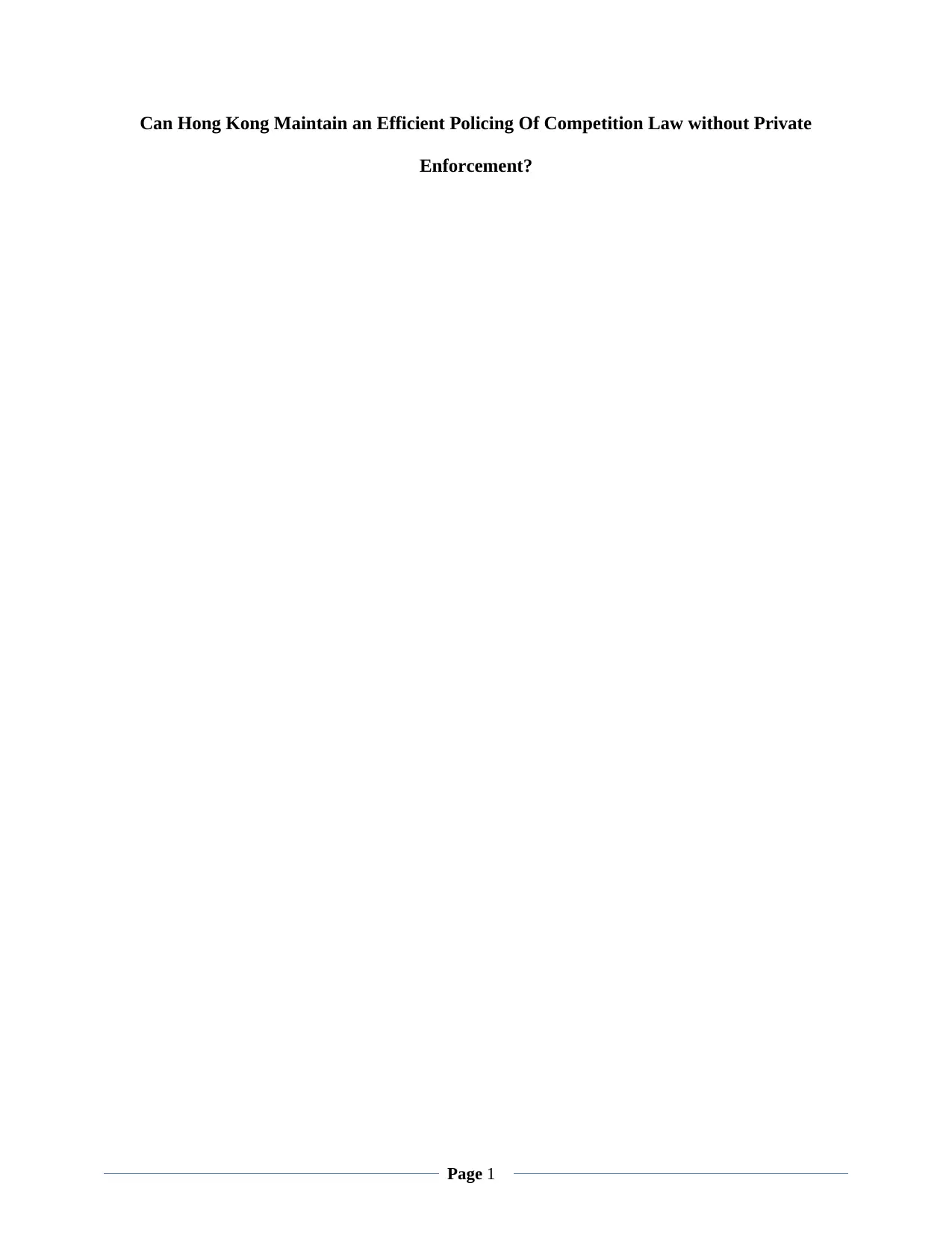
Can Hong Kong Maintain an Efficient Policing Of Competition Law without Private
Enforcement?
Page 1
Enforcement?
Page 1
Paraphrase This Document
Need a fresh take? Get an instant paraphrase of this document with our AI Paraphraser
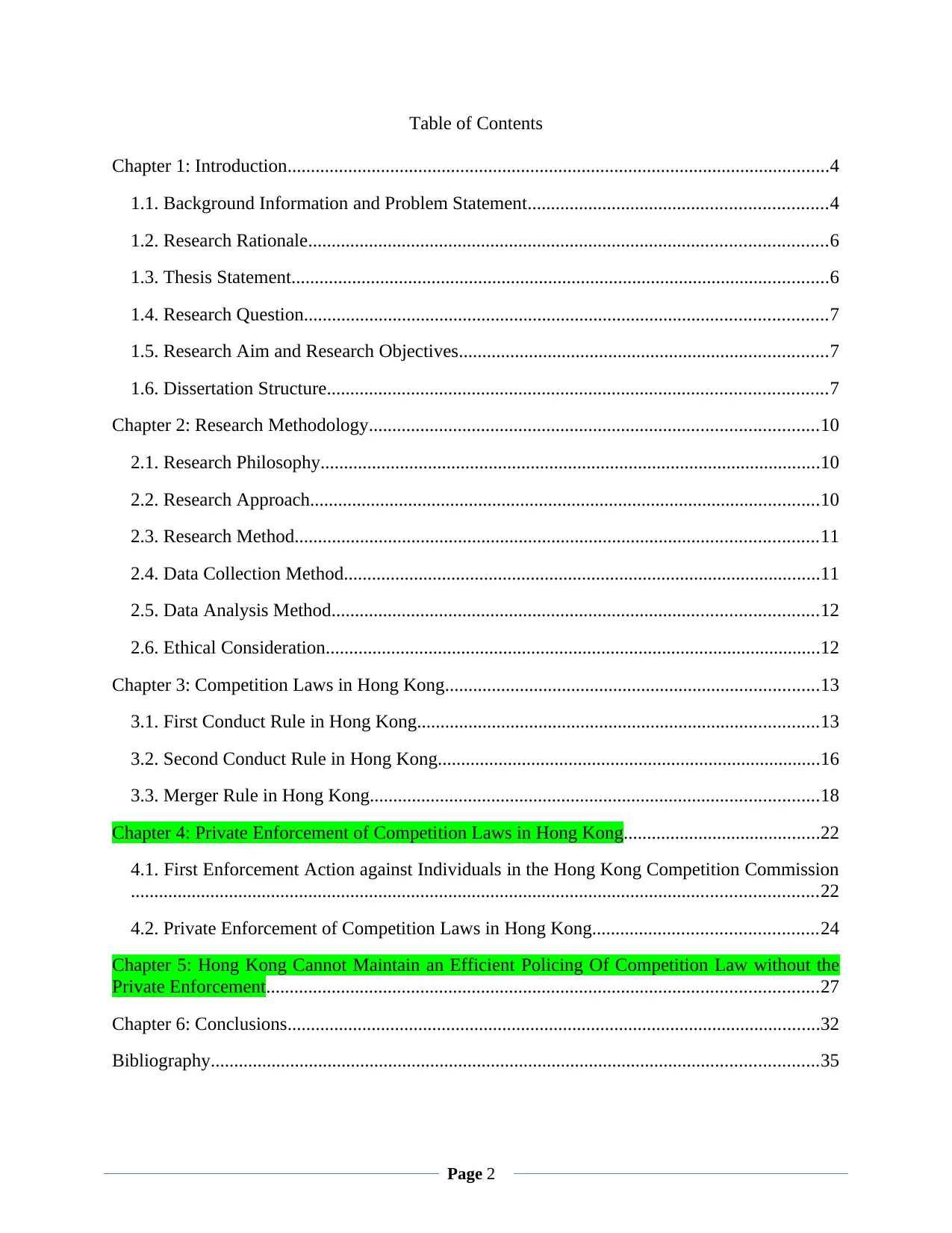
Table of Contents
Chapter 1: Introduction....................................................................................................................4
1.1. Background Information and Problem Statement................................................................4
1.2. Research Rationale...............................................................................................................6
1.3. Thesis Statement...................................................................................................................6
1.4. Research Question................................................................................................................7
1.5. Research Aim and Research Objectives...............................................................................7
1.6. Dissertation Structure...........................................................................................................7
Chapter 2: Research Methodology................................................................................................10
2.1. Research Philosophy...........................................................................................................10
2.2. Research Approach.............................................................................................................10
2.3. Research Method................................................................................................................11
2.4. Data Collection Method......................................................................................................11
2.5. Data Analysis Method........................................................................................................12
2.6. Ethical Consideration..........................................................................................................12
Chapter 3: Competition Laws in Hong Kong................................................................................13
3.1. First Conduct Rule in Hong Kong......................................................................................13
3.2. Second Conduct Rule in Hong Kong..................................................................................16
3.3. Merger Rule in Hong Kong................................................................................................18
Chapter 4: Private Enforcement of Competition Laws in Hong Kong..........................................22
4.1. First Enforcement Action against Individuals in the Hong Kong Competition Commission
...................................................................................................................................................22
4.2. Private Enforcement of Competition Laws in Hong Kong................................................24
Chapter 5: Hong Kong Cannot Maintain an Efficient Policing Of Competition Law without the
Private Enforcement......................................................................................................................27
Chapter 6: Conclusions..................................................................................................................32
Bibliography..................................................................................................................................35
Page 2
Chapter 1: Introduction....................................................................................................................4
1.1. Background Information and Problem Statement................................................................4
1.2. Research Rationale...............................................................................................................6
1.3. Thesis Statement...................................................................................................................6
1.4. Research Question................................................................................................................7
1.5. Research Aim and Research Objectives...............................................................................7
1.6. Dissertation Structure...........................................................................................................7
Chapter 2: Research Methodology................................................................................................10
2.1. Research Philosophy...........................................................................................................10
2.2. Research Approach.............................................................................................................10
2.3. Research Method................................................................................................................11
2.4. Data Collection Method......................................................................................................11
2.5. Data Analysis Method........................................................................................................12
2.6. Ethical Consideration..........................................................................................................12
Chapter 3: Competition Laws in Hong Kong................................................................................13
3.1. First Conduct Rule in Hong Kong......................................................................................13
3.2. Second Conduct Rule in Hong Kong..................................................................................16
3.3. Merger Rule in Hong Kong................................................................................................18
Chapter 4: Private Enforcement of Competition Laws in Hong Kong..........................................22
4.1. First Enforcement Action against Individuals in the Hong Kong Competition Commission
...................................................................................................................................................22
4.2. Private Enforcement of Competition Laws in Hong Kong................................................24
Chapter 5: Hong Kong Cannot Maintain an Efficient Policing Of Competition Law without the
Private Enforcement......................................................................................................................27
Chapter 6: Conclusions..................................................................................................................32
Bibliography..................................................................................................................................35
Page 2
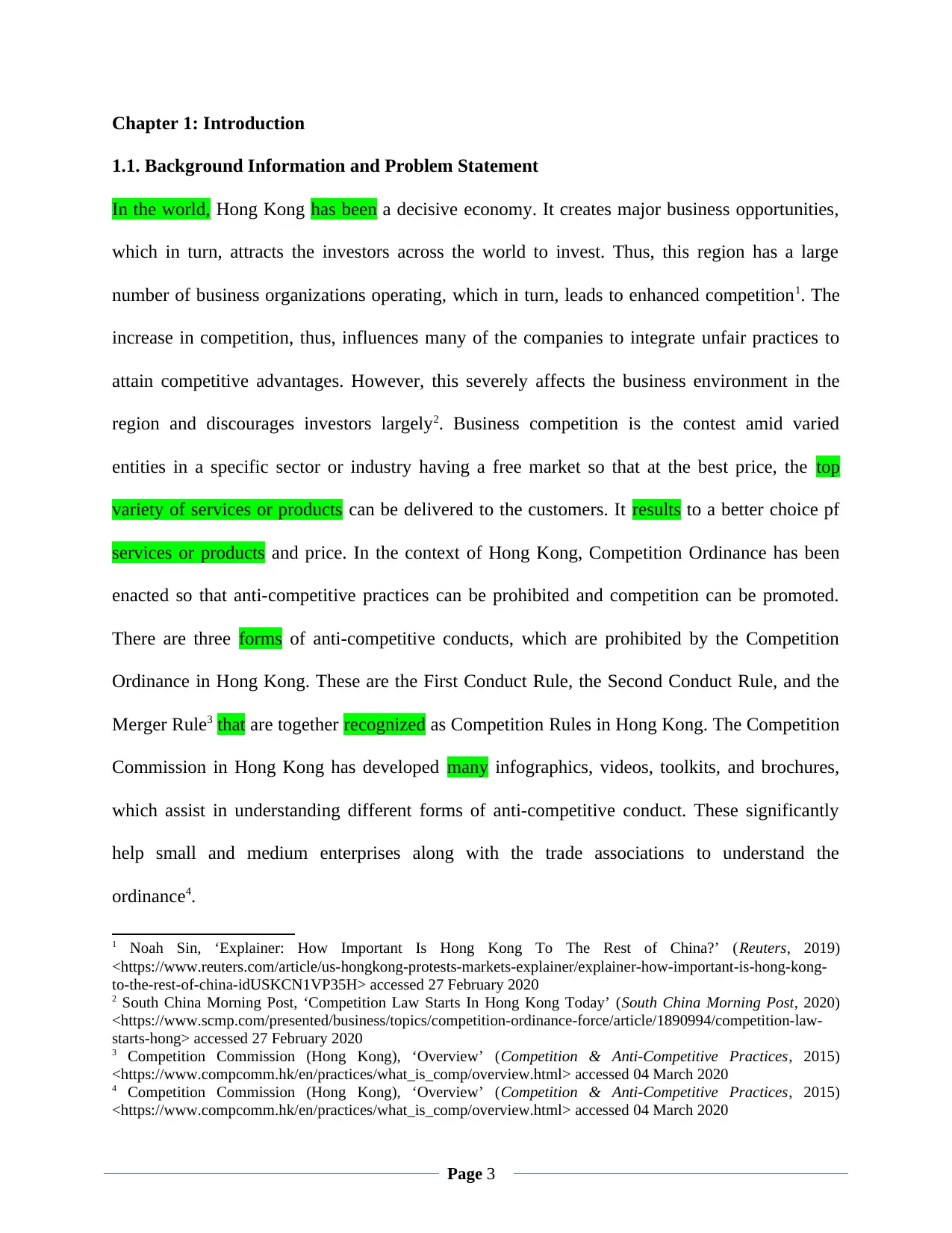
Chapter 1: Introduction
1.1. Background Information and Problem Statement
In the world, Hong Kong has been a decisive economy. It creates major business opportunities,
which in turn, attracts the investors across the world to invest. Thus, this region has a large
number of business organizations operating, which in turn, leads to enhanced competition1. The
increase in competition, thus, influences many of the companies to integrate unfair practices to
attain competitive advantages. However, this severely affects the business environment in the
region and discourages investors largely2. Business competition is the contest amid varied
entities in a specific sector or industry having a free market so that at the best price, the top
variety of services or products can be delivered to the customers. It results to a better choice pf
services or products and price. In the context of Hong Kong, Competition Ordinance has been
enacted so that anti-competitive practices can be prohibited and competition can be promoted.
There are three forms of anti-competitive conducts, which are prohibited by the Competition
Ordinance in Hong Kong. These are the First Conduct Rule, the Second Conduct Rule, and the
Merger Rule3 that are together recognized as Competition Rules in Hong Kong. The Competition
Commission in Hong Kong has developed many infographics, videos, toolkits, and brochures,
which assist in understanding different forms of anti-competitive conduct. These significantly
help small and medium enterprises along with the trade associations to understand the
ordinance4.
1 Noah Sin, ‘Explainer: How Important Is Hong Kong To The Rest of China?’ (Reuters, 2019)
<https://www.reuters.com/article/us-hongkong-protests-markets-explainer/explainer-how-important-is-hong-kong-
to-the-rest-of-china-idUSKCN1VP35H> accessed 27 February 2020
2 South China Morning Post, ‘Competition Law Starts In Hong Kong Today’ (South China Morning Post, 2020)
<https://www.scmp.com/presented/business/topics/competition-ordinance-force/article/1890994/competition-law-
starts-hong> accessed 27 February 2020
3 Competition Commission (Hong Kong), ‘Overview’ (Competition & Anti-Competitive Practices, 2015)
<https://www.compcomm.hk/en/practices/what_is_comp/overview.html> accessed 04 March 2020
4 Competition Commission (Hong Kong), ‘Overview’ (Competition & Anti-Competitive Practices, 2015)
<https://www.compcomm.hk/en/practices/what_is_comp/overview.html> accessed 04 March 2020
Page 3
1.1. Background Information and Problem Statement
In the world, Hong Kong has been a decisive economy. It creates major business opportunities,
which in turn, attracts the investors across the world to invest. Thus, this region has a large
number of business organizations operating, which in turn, leads to enhanced competition1. The
increase in competition, thus, influences many of the companies to integrate unfair practices to
attain competitive advantages. However, this severely affects the business environment in the
region and discourages investors largely2. Business competition is the contest amid varied
entities in a specific sector or industry having a free market so that at the best price, the top
variety of services or products can be delivered to the customers. It results to a better choice pf
services or products and price. In the context of Hong Kong, Competition Ordinance has been
enacted so that anti-competitive practices can be prohibited and competition can be promoted.
There are three forms of anti-competitive conducts, which are prohibited by the Competition
Ordinance in Hong Kong. These are the First Conduct Rule, the Second Conduct Rule, and the
Merger Rule3 that are together recognized as Competition Rules in Hong Kong. The Competition
Commission in Hong Kong has developed many infographics, videos, toolkits, and brochures,
which assist in understanding different forms of anti-competitive conduct. These significantly
help small and medium enterprises along with the trade associations to understand the
ordinance4.
1 Noah Sin, ‘Explainer: How Important Is Hong Kong To The Rest of China?’ (Reuters, 2019)
<https://www.reuters.com/article/us-hongkong-protests-markets-explainer/explainer-how-important-is-hong-kong-
to-the-rest-of-china-idUSKCN1VP35H> accessed 27 February 2020
2 South China Morning Post, ‘Competition Law Starts In Hong Kong Today’ (South China Morning Post, 2020)
<https://www.scmp.com/presented/business/topics/competition-ordinance-force/article/1890994/competition-law-
starts-hong> accessed 27 February 2020
3 Competition Commission (Hong Kong), ‘Overview’ (Competition & Anti-Competitive Practices, 2015)
<https://www.compcomm.hk/en/practices/what_is_comp/overview.html> accessed 04 March 2020
4 Competition Commission (Hong Kong), ‘Overview’ (Competition & Anti-Competitive Practices, 2015)
<https://www.compcomm.hk/en/practices/what_is_comp/overview.html> accessed 04 March 2020
Page 3
⊘ This is a preview!⊘
Do you want full access?
Subscribe today to unlock all pages.

Trusted by 1+ million students worldwide
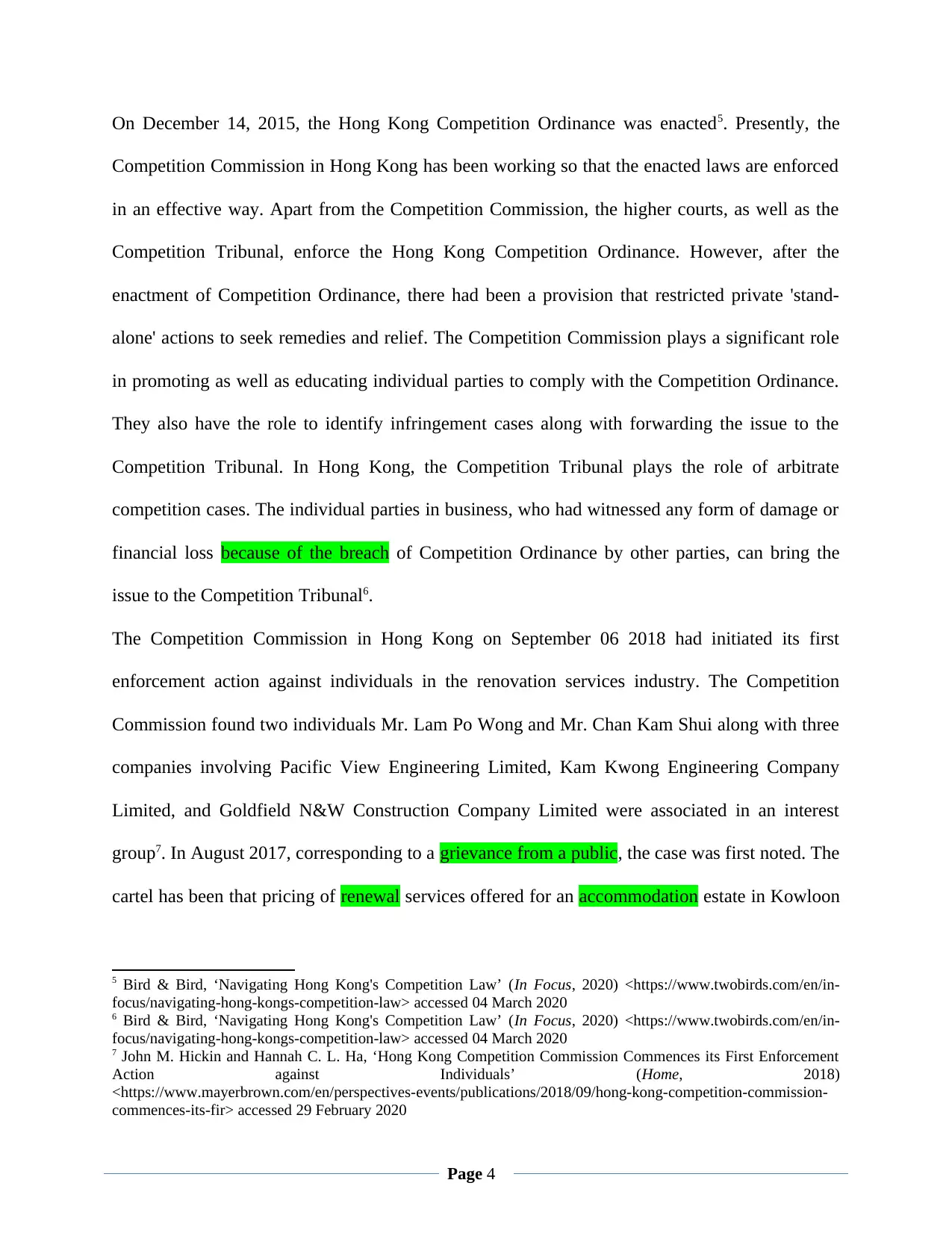
On December 14, 2015, the Hong Kong Competition Ordinance was enacted5. Presently, the
Competition Commission in Hong Kong has been working so that the enacted laws are enforced
in an effective way. Apart from the Competition Commission, the higher courts, as well as the
Competition Tribunal, enforce the Hong Kong Competition Ordinance. However, after the
enactment of Competition Ordinance, there had been a provision that restricted private 'stand-
alone' actions to seek remedies and relief. The Competition Commission plays a significant role
in promoting as well as educating individual parties to comply with the Competition Ordinance.
They also have the role to identify infringement cases along with forwarding the issue to the
Competition Tribunal. In Hong Kong, the Competition Tribunal plays the role of arbitrate
competition cases. The individual parties in business, who had witnessed any form of damage or
financial loss because of the breach of Competition Ordinance by other parties, can bring the
issue to the Competition Tribunal6.
The Competition Commission in Hong Kong on September 06 2018 had initiated its first
enforcement action against individuals in the renovation services industry. The Competition
Commission found two individuals Mr. Lam Po Wong and Mr. Chan Kam Shui along with three
companies involving Pacific View Engineering Limited, Kam Kwong Engineering Company
Limited, and Goldfield N&W Construction Company Limited were associated in an interest
group7. In August 2017, corresponding to a grievance from a public, the case was first noted. The
cartel has been that pricing of renewal services offered for an accommodation estate in Kowloon
5 Bird & Bird, ‘Navigating Hong Kong's Competition Law’ (In Focus, 2020) <https://www.twobirds.com/en/in-
focus/navigating-hong-kongs-competition-law> accessed 04 March 2020
6 Bird & Bird, ‘Navigating Hong Kong's Competition Law’ (In Focus, 2020) <https://www.twobirds.com/en/in-
focus/navigating-hong-kongs-competition-law> accessed 04 March 2020
7 John M. Hickin and Hannah C. L. Ha, ‘Hong Kong Competition Commission Commences its First Enforcement
Action against Individuals’ (Home, 2018)
<https://www.mayerbrown.com/en/perspectives-events/publications/2018/09/hong-kong-competition-commission-
commences-its-fir> accessed 29 February 2020
Page 4
Competition Commission in Hong Kong has been working so that the enacted laws are enforced
in an effective way. Apart from the Competition Commission, the higher courts, as well as the
Competition Tribunal, enforce the Hong Kong Competition Ordinance. However, after the
enactment of Competition Ordinance, there had been a provision that restricted private 'stand-
alone' actions to seek remedies and relief. The Competition Commission plays a significant role
in promoting as well as educating individual parties to comply with the Competition Ordinance.
They also have the role to identify infringement cases along with forwarding the issue to the
Competition Tribunal. In Hong Kong, the Competition Tribunal plays the role of arbitrate
competition cases. The individual parties in business, who had witnessed any form of damage or
financial loss because of the breach of Competition Ordinance by other parties, can bring the
issue to the Competition Tribunal6.
The Competition Commission in Hong Kong on September 06 2018 had initiated its first
enforcement action against individuals in the renovation services industry. The Competition
Commission found two individuals Mr. Lam Po Wong and Mr. Chan Kam Shui along with three
companies involving Pacific View Engineering Limited, Kam Kwong Engineering Company
Limited, and Goldfield N&W Construction Company Limited were associated in an interest
group7. In August 2017, corresponding to a grievance from a public, the case was first noted. The
cartel has been that pricing of renewal services offered for an accommodation estate in Kowloon
5 Bird & Bird, ‘Navigating Hong Kong's Competition Law’ (In Focus, 2020) <https://www.twobirds.com/en/in-
focus/navigating-hong-kongs-competition-law> accessed 04 March 2020
6 Bird & Bird, ‘Navigating Hong Kong's Competition Law’ (In Focus, 2020) <https://www.twobirds.com/en/in-
focus/navigating-hong-kongs-competition-law> accessed 04 March 2020
7 John M. Hickin and Hannah C. L. Ha, ‘Hong Kong Competition Commission Commences its First Enforcement
Action against Individuals’ (Home, 2018)
<https://www.mayerbrown.com/en/perspectives-events/publications/2018/09/hong-kong-competition-commission-
commences-its-fir> accessed 29 February 2020
Page 4
Paraphrase This Document
Need a fresh take? Get an instant paraphrase of this document with our AI Paraphraser
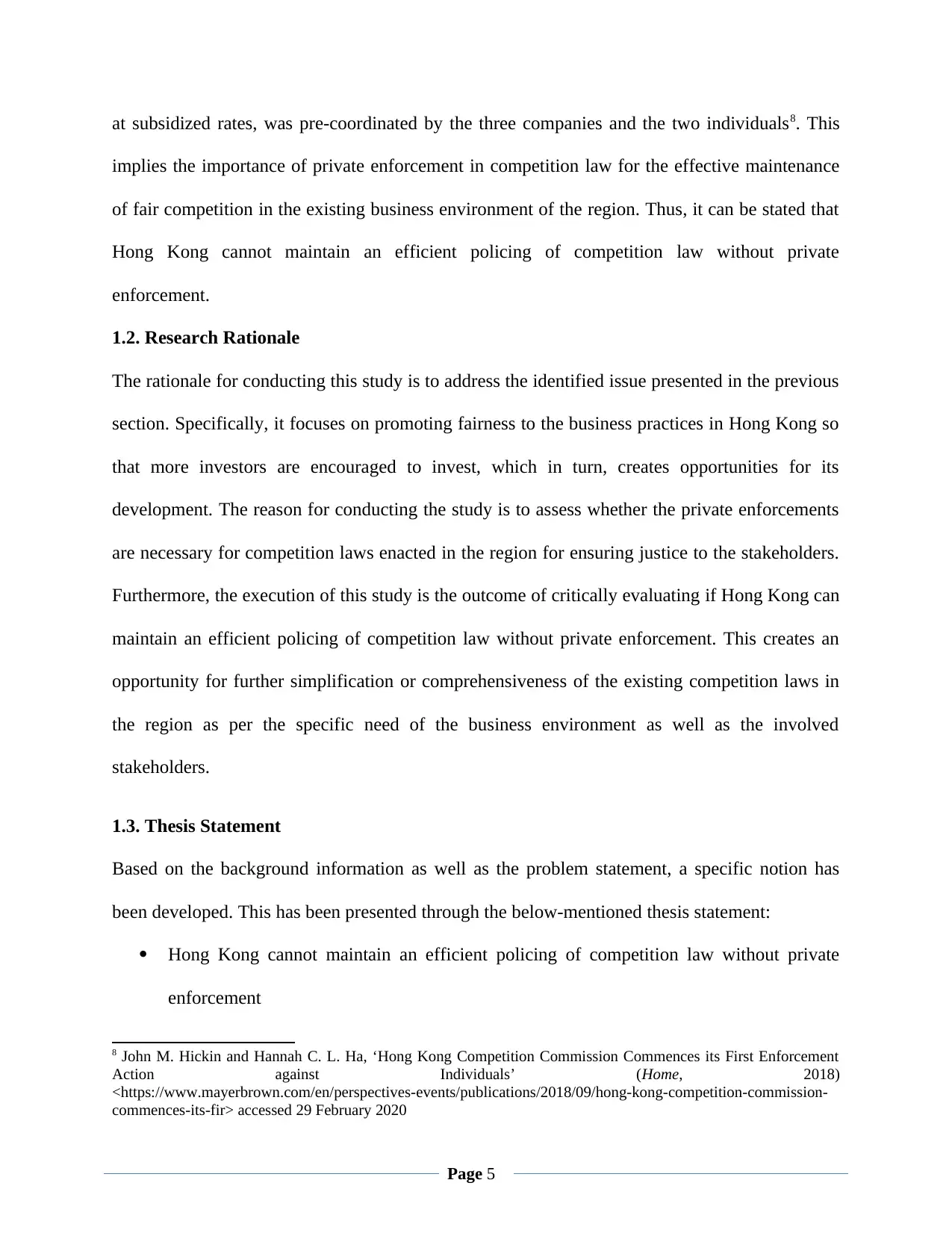
at subsidized rates, was pre-coordinated by the three companies and the two individuals8. This
implies the importance of private enforcement in competition law for the effective maintenance
of fair competition in the existing business environment of the region. Thus, it can be stated that
Hong Kong cannot maintain an efficient policing of competition law without private
enforcement.
1.2. Research Rationale
The rationale for conducting this study is to address the identified issue presented in the previous
section. Specifically, it focuses on promoting fairness to the business practices in Hong Kong so
that more investors are encouraged to invest, which in turn, creates opportunities for its
development. The reason for conducting the study is to assess whether the private enforcements
are necessary for competition laws enacted in the region for ensuring justice to the stakeholders.
Furthermore, the execution of this study is the outcome of critically evaluating if Hong Kong can
maintain an efficient policing of competition law without private enforcement. This creates an
opportunity for further simplification or comprehensiveness of the existing competition laws in
the region as per the specific need of the business environment as well as the involved
stakeholders.
1.3. Thesis Statement
Based on the background information as well as the problem statement, a specific notion has
been developed. This has been presented through the below-mentioned thesis statement:
Hong Kong cannot maintain an efficient policing of competition law without private
enforcement
8 John M. Hickin and Hannah C. L. Ha, ‘Hong Kong Competition Commission Commences its First Enforcement
Action against Individuals’ (Home, 2018)
<https://www.mayerbrown.com/en/perspectives-events/publications/2018/09/hong-kong-competition-commission-
commences-its-fir> accessed 29 February 2020
Page 5
implies the importance of private enforcement in competition law for the effective maintenance
of fair competition in the existing business environment of the region. Thus, it can be stated that
Hong Kong cannot maintain an efficient policing of competition law without private
enforcement.
1.2. Research Rationale
The rationale for conducting this study is to address the identified issue presented in the previous
section. Specifically, it focuses on promoting fairness to the business practices in Hong Kong so
that more investors are encouraged to invest, which in turn, creates opportunities for its
development. The reason for conducting the study is to assess whether the private enforcements
are necessary for competition laws enacted in the region for ensuring justice to the stakeholders.
Furthermore, the execution of this study is the outcome of critically evaluating if Hong Kong can
maintain an efficient policing of competition law without private enforcement. This creates an
opportunity for further simplification or comprehensiveness of the existing competition laws in
the region as per the specific need of the business environment as well as the involved
stakeholders.
1.3. Thesis Statement
Based on the background information as well as the problem statement, a specific notion has
been developed. This has been presented through the below-mentioned thesis statement:
Hong Kong cannot maintain an efficient policing of competition law without private
enforcement
8 John M. Hickin and Hannah C. L. Ha, ‘Hong Kong Competition Commission Commences its First Enforcement
Action against Individuals’ (Home, 2018)
<https://www.mayerbrown.com/en/perspectives-events/publications/2018/09/hong-kong-competition-commission-
commences-its-fir> accessed 29 February 2020
Page 5

1.4. Research Question
Based on the thesis statement, a specific research question has been prepared. This is so that the
required information is obtained and the validity of the thesis statement can be checked. The
specific research question has thus been presented below:
Can Hong Kong maintain an efficient policing of competition law without private
enforcement?
1.5. Research Aim and Research Objectives
Based on the research, it is necessary to determine a specific research aim so that the study is
properly directed and the desired outcome is obtained. In this regard, the research has aimed at
determining whether Hong Kong can maintain an efficient policing of competition law without
private enforcement. To attain this aim comprehensively, it is important to construct some of the
research objectives, which have been presented below:
To explore the competition laws in Hong Kong
To investigate private enforcement of competition laws in Hong Kong
To advise whether Hong Kong can maintain an efficient policing of competition law
without private enforcement
Page 6
Based on the thesis statement, a specific research question has been prepared. This is so that the
required information is obtained and the validity of the thesis statement can be checked. The
specific research question has thus been presented below:
Can Hong Kong maintain an efficient policing of competition law without private
enforcement?
1.5. Research Aim and Research Objectives
Based on the research, it is necessary to determine a specific research aim so that the study is
properly directed and the desired outcome is obtained. In this regard, the research has aimed at
determining whether Hong Kong can maintain an efficient policing of competition law without
private enforcement. To attain this aim comprehensively, it is important to construct some of the
research objectives, which have been presented below:
To explore the competition laws in Hong Kong
To investigate private enforcement of competition laws in Hong Kong
To advise whether Hong Kong can maintain an efficient policing of competition law
without private enforcement
Page 6
⊘ This is a preview!⊘
Do you want full access?
Subscribe today to unlock all pages.

Trusted by 1+ million students worldwide
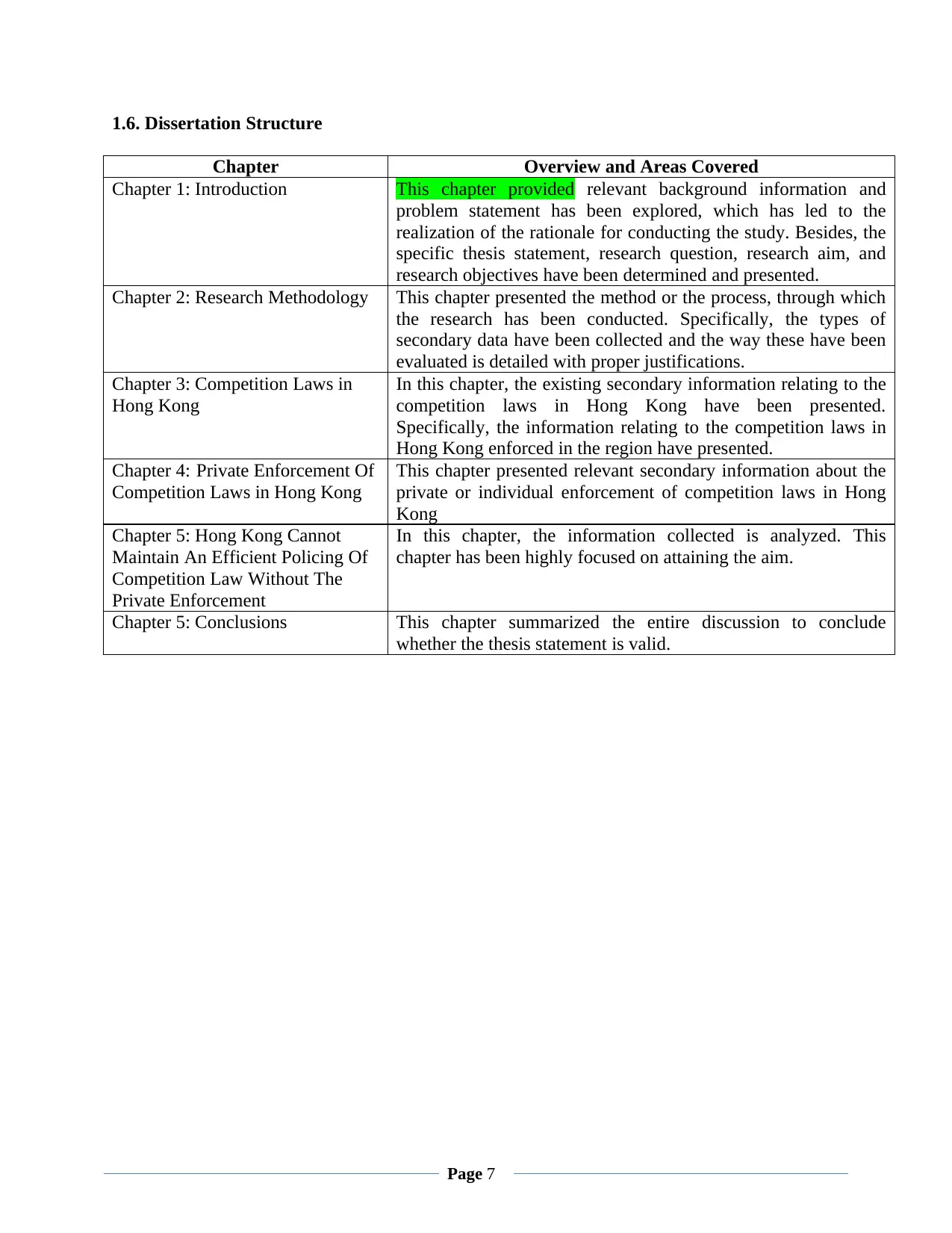
1.6. Dissertation Structure
Chapter Overview and Areas Covered
Chapter 1: Introduction This chapter provided relevant background information and
problem statement has been explored, which has led to the
realization of the rationale for conducting the study. Besides, the
specific thesis statement, research question, research aim, and
research objectives have been determined and presented.
Chapter 2: Research Methodology This chapter presented the method or the process, through which
the research has been conducted. Specifically, the types of
secondary data have been collected and the way these have been
evaluated is detailed with proper justifications.
Chapter 3: Competition Laws in
Hong Kong
In this chapter, the existing secondary information relating to the
competition laws in Hong Kong have been presented.
Specifically, the information relating to the competition laws in
Hong Kong enforced in the region have presented.
Chapter 4: Private Enforcement Of
Competition Laws in Hong Kong
This chapter presented relevant secondary information about the
private or individual enforcement of competition laws in Hong
Kong
Chapter 5: Hong Kong Cannot
Maintain An Efficient Policing Of
Competition Law Without The
Private Enforcement
In this chapter, the information collected is analyzed. This
chapter has been highly focused on attaining the aim.
Chapter 5: Conclusions This chapter summarized the entire discussion to conclude
whether the thesis statement is valid.
Page 7
Chapter Overview and Areas Covered
Chapter 1: Introduction This chapter provided relevant background information and
problem statement has been explored, which has led to the
realization of the rationale for conducting the study. Besides, the
specific thesis statement, research question, research aim, and
research objectives have been determined and presented.
Chapter 2: Research Methodology This chapter presented the method or the process, through which
the research has been conducted. Specifically, the types of
secondary data have been collected and the way these have been
evaluated is detailed with proper justifications.
Chapter 3: Competition Laws in
Hong Kong
In this chapter, the existing secondary information relating to the
competition laws in Hong Kong have been presented.
Specifically, the information relating to the competition laws in
Hong Kong enforced in the region have presented.
Chapter 4: Private Enforcement Of
Competition Laws in Hong Kong
This chapter presented relevant secondary information about the
private or individual enforcement of competition laws in Hong
Kong
Chapter 5: Hong Kong Cannot
Maintain An Efficient Policing Of
Competition Law Without The
Private Enforcement
In this chapter, the information collected is analyzed. This
chapter has been highly focused on attaining the aim.
Chapter 5: Conclusions This chapter summarized the entire discussion to conclude
whether the thesis statement is valid.
Page 7
Paraphrase This Document
Need a fresh take? Get an instant paraphrase of this document with our AI Paraphraser
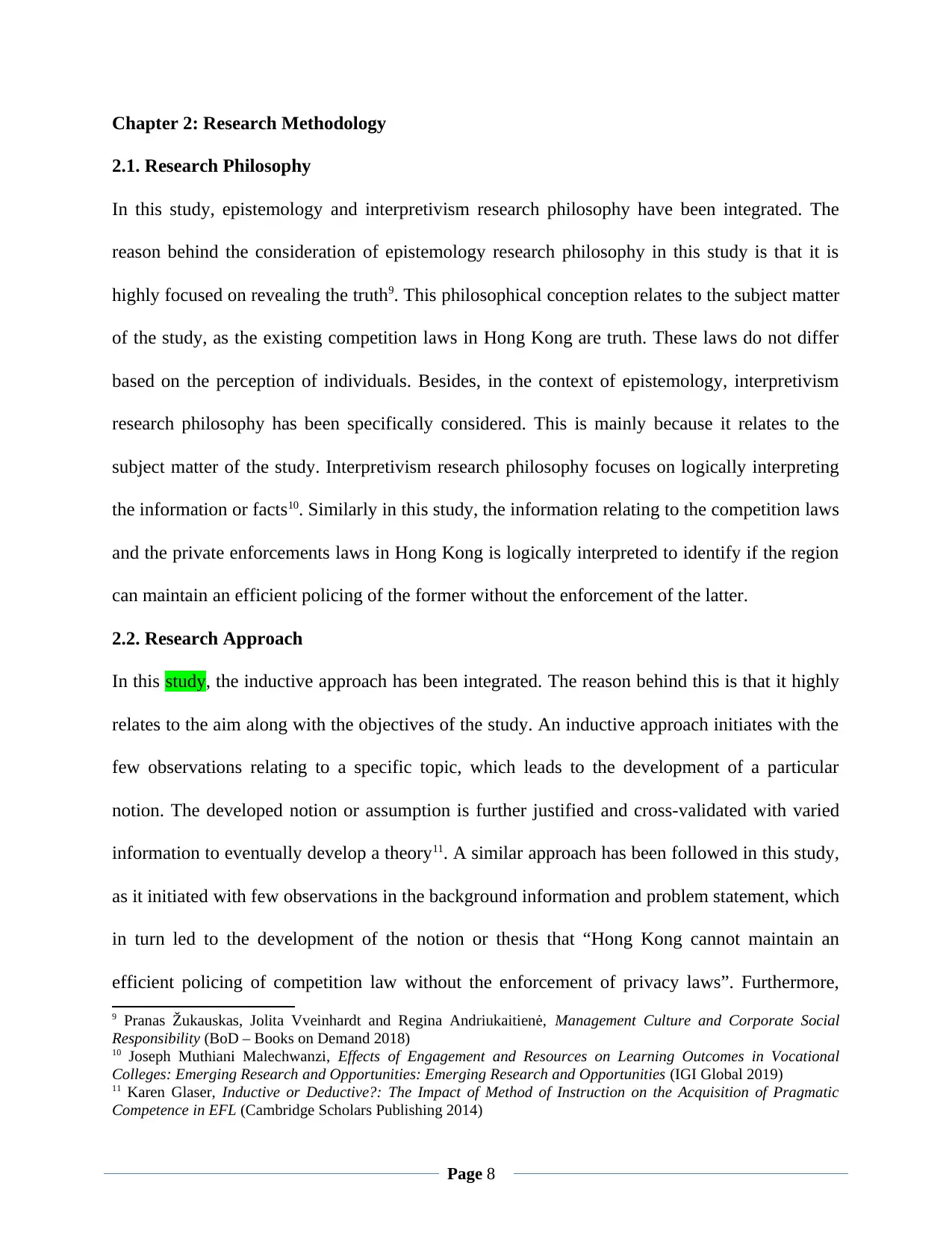
Chapter 2: Research Methodology
2.1. Research Philosophy
In this study, epistemology and interpretivism research philosophy have been integrated. The
reason behind the consideration of epistemology research philosophy in this study is that it is
highly focused on revealing the truth9. This philosophical conception relates to the subject matter
of the study, as the existing competition laws in Hong Kong are truth. These laws do not differ
based on the perception of individuals. Besides, in the context of epistemology, interpretivism
research philosophy has been specifically considered. This is mainly because it relates to the
subject matter of the study. Interpretivism research philosophy focuses on logically interpreting
the information or facts10. Similarly in this study, the information relating to the competition laws
and the private enforcements laws in Hong Kong is logically interpreted to identify if the region
can maintain an efficient policing of the former without the enforcement of the latter.
2.2. Research Approach
In this study, the inductive approach has been integrated. The reason behind this is that it highly
relates to the aim along with the objectives of the study. An inductive approach initiates with the
few observations relating to a specific topic, which leads to the development of a particular
notion. The developed notion or assumption is further justified and cross-validated with varied
information to eventually develop a theory11. A similar approach has been followed in this study,
as it initiated with few observations in the background information and problem statement, which
in turn led to the development of the notion or thesis that “Hong Kong cannot maintain an
efficient policing of competition law without the enforcement of privacy laws”. Furthermore,
9 Pranas Žukauskas, Jolita Vveinhardt and Regina Andriukaitienė, Management Culture and Corporate Social
Responsibility (BoD – Books on Demand 2018)
10 Joseph Muthiani Malechwanzi, Effects of Engagement and Resources on Learning Outcomes in Vocational
Colleges: Emerging Research and Opportunities: Emerging Research and Opportunities (IGI Global 2019)
11 Karen Glaser, Inductive or Deductive?: The Impact of Method of Instruction on the Acquisition of Pragmatic
Competence in EFL (Cambridge Scholars Publishing 2014)
Page 8
2.1. Research Philosophy
In this study, epistemology and interpretivism research philosophy have been integrated. The
reason behind the consideration of epistemology research philosophy in this study is that it is
highly focused on revealing the truth9. This philosophical conception relates to the subject matter
of the study, as the existing competition laws in Hong Kong are truth. These laws do not differ
based on the perception of individuals. Besides, in the context of epistemology, interpretivism
research philosophy has been specifically considered. This is mainly because it relates to the
subject matter of the study. Interpretivism research philosophy focuses on logically interpreting
the information or facts10. Similarly in this study, the information relating to the competition laws
and the private enforcements laws in Hong Kong is logically interpreted to identify if the region
can maintain an efficient policing of the former without the enforcement of the latter.
2.2. Research Approach
In this study, the inductive approach has been integrated. The reason behind this is that it highly
relates to the aim along with the objectives of the study. An inductive approach initiates with the
few observations relating to a specific topic, which leads to the development of a particular
notion. The developed notion or assumption is further justified and cross-validated with varied
information to eventually develop a theory11. A similar approach has been followed in this study,
as it initiated with few observations in the background information and problem statement, which
in turn led to the development of the notion or thesis that “Hong Kong cannot maintain an
efficient policing of competition law without the enforcement of privacy laws”. Furthermore,
9 Pranas Žukauskas, Jolita Vveinhardt and Regina Andriukaitienė, Management Culture and Corporate Social
Responsibility (BoD – Books on Demand 2018)
10 Joseph Muthiani Malechwanzi, Effects of Engagement and Resources on Learning Outcomes in Vocational
Colleges: Emerging Research and Opportunities: Emerging Research and Opportunities (IGI Global 2019)
11 Karen Glaser, Inductive or Deductive?: The Impact of Method of Instruction on the Acquisition of Pragmatic
Competence in EFL (Cambridge Scholars Publishing 2014)
Page 8
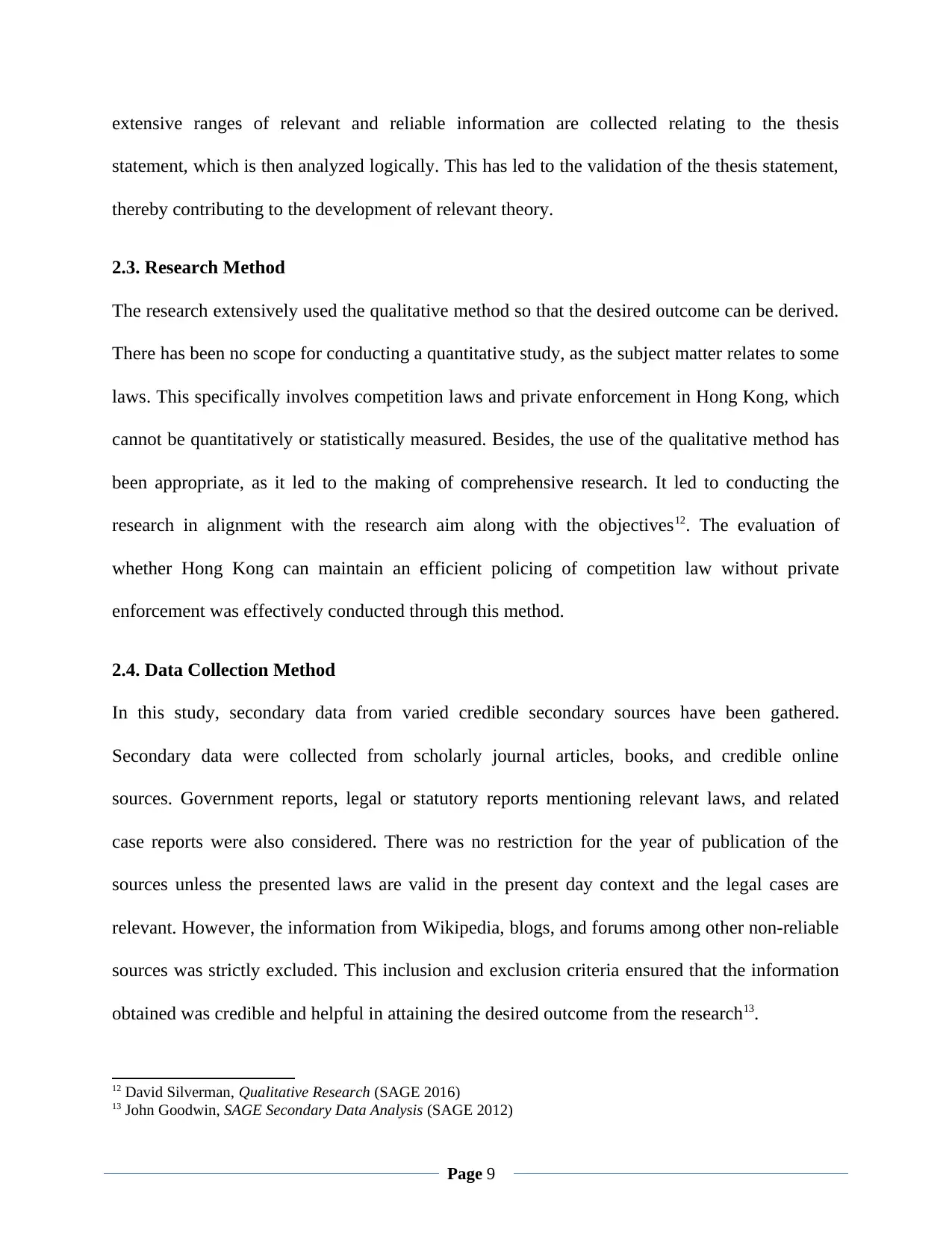
extensive ranges of relevant and reliable information are collected relating to the thesis
statement, which is then analyzed logically. This has led to the validation of the thesis statement,
thereby contributing to the development of relevant theory.
2.3. Research Method
The research extensively used the qualitative method so that the desired outcome can be derived.
There has been no scope for conducting a quantitative study, as the subject matter relates to some
laws. This specifically involves competition laws and private enforcement in Hong Kong, which
cannot be quantitatively or statistically measured. Besides, the use of the qualitative method has
been appropriate, as it led to the making of comprehensive research. It led to conducting the
research in alignment with the research aim along with the objectives12. The evaluation of
whether Hong Kong can maintain an efficient policing of competition law without private
enforcement was effectively conducted through this method.
2.4. Data Collection Method
In this study, secondary data from varied credible secondary sources have been gathered.
Secondary data were collected from scholarly journal articles, books, and credible online
sources. Government reports, legal or statutory reports mentioning relevant laws, and related
case reports were also considered. There was no restriction for the year of publication of the
sources unless the presented laws are valid in the present day context and the legal cases are
relevant. However, the information from Wikipedia, blogs, and forums among other non-reliable
sources was strictly excluded. This inclusion and exclusion criteria ensured that the information
obtained was credible and helpful in attaining the desired outcome from the research13.
12 David Silverman, Qualitative Research (SAGE 2016)
13 John Goodwin, SAGE Secondary Data Analysis (SAGE 2012)
Page 9
statement, which is then analyzed logically. This has led to the validation of the thesis statement,
thereby contributing to the development of relevant theory.
2.3. Research Method
The research extensively used the qualitative method so that the desired outcome can be derived.
There has been no scope for conducting a quantitative study, as the subject matter relates to some
laws. This specifically involves competition laws and private enforcement in Hong Kong, which
cannot be quantitatively or statistically measured. Besides, the use of the qualitative method has
been appropriate, as it led to the making of comprehensive research. It led to conducting the
research in alignment with the research aim along with the objectives12. The evaluation of
whether Hong Kong can maintain an efficient policing of competition law without private
enforcement was effectively conducted through this method.
2.4. Data Collection Method
In this study, secondary data from varied credible secondary sources have been gathered.
Secondary data were collected from scholarly journal articles, books, and credible online
sources. Government reports, legal or statutory reports mentioning relevant laws, and related
case reports were also considered. There was no restriction for the year of publication of the
sources unless the presented laws are valid in the present day context and the legal cases are
relevant. However, the information from Wikipedia, blogs, and forums among other non-reliable
sources was strictly excluded. This inclusion and exclusion criteria ensured that the information
obtained was credible and helpful in attaining the desired outcome from the research13.
12 David Silverman, Qualitative Research (SAGE 2016)
13 John Goodwin, SAGE Secondary Data Analysis (SAGE 2012)
Page 9
⊘ This is a preview!⊘
Do you want full access?
Subscribe today to unlock all pages.

Trusted by 1+ million students worldwide
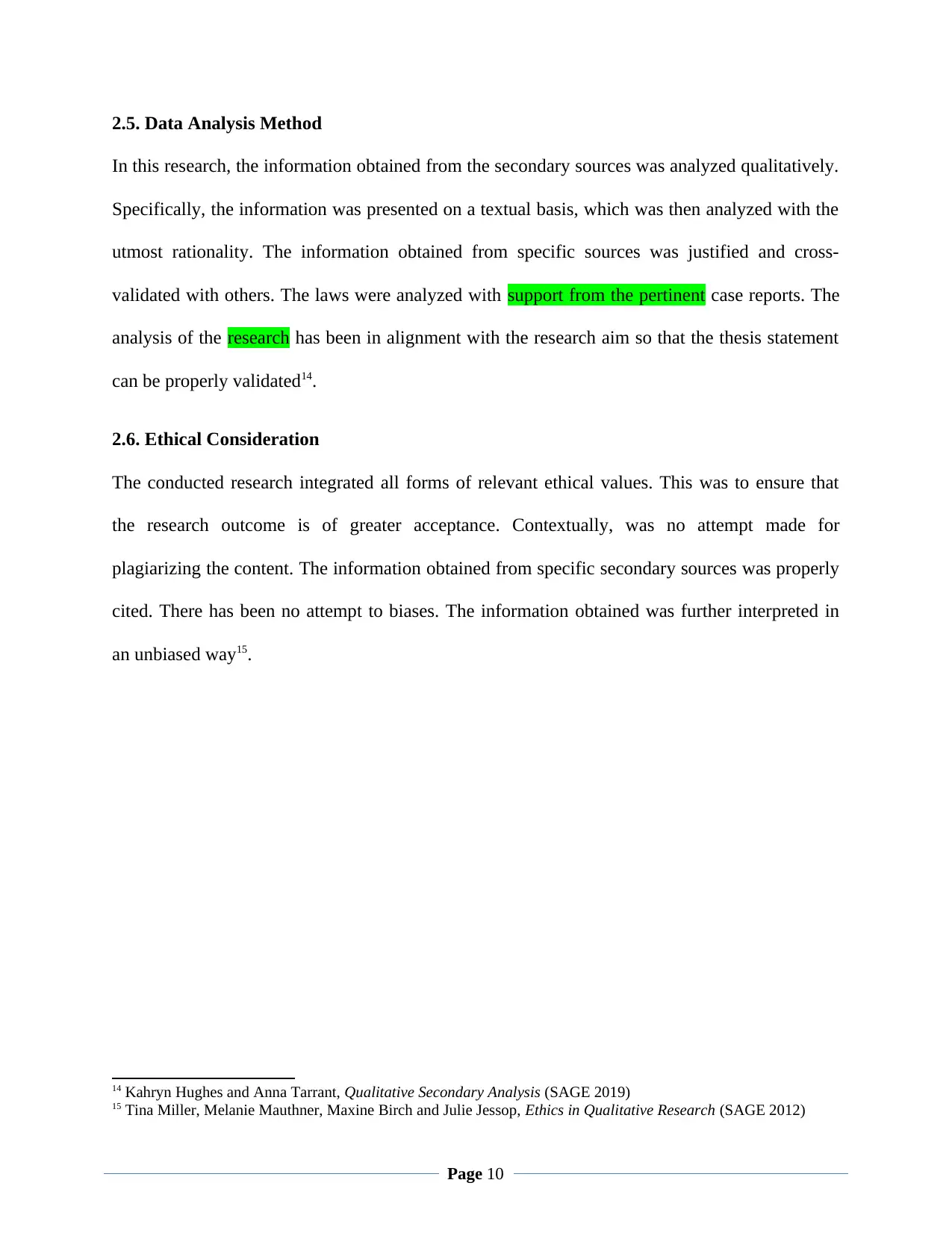
2.5. Data Analysis Method
In this research, the information obtained from the secondary sources was analyzed qualitatively.
Specifically, the information was presented on a textual basis, which was then analyzed with the
utmost rationality. The information obtained from specific sources was justified and cross-
validated with others. The laws were analyzed with support from the pertinent case reports. The
analysis of the research has been in alignment with the research aim so that the thesis statement
can be properly validated14.
2.6. Ethical Consideration
The conducted research integrated all forms of relevant ethical values. This was to ensure that
the research outcome is of greater acceptance. Contextually, was no attempt made for
plagiarizing the content. The information obtained from specific secondary sources was properly
cited. There has been no attempt to biases. The information obtained was further interpreted in
an unbiased way15.
14 Kahryn Hughes and Anna Tarrant, Qualitative Secondary Analysis (SAGE 2019)
15 Tina Miller, Melanie Mauthner, Maxine Birch and Julie Jessop, Ethics in Qualitative Research (SAGE 2012)
Page 10
In this research, the information obtained from the secondary sources was analyzed qualitatively.
Specifically, the information was presented on a textual basis, which was then analyzed with the
utmost rationality. The information obtained from specific sources was justified and cross-
validated with others. The laws were analyzed with support from the pertinent case reports. The
analysis of the research has been in alignment with the research aim so that the thesis statement
can be properly validated14.
2.6. Ethical Consideration
The conducted research integrated all forms of relevant ethical values. This was to ensure that
the research outcome is of greater acceptance. Contextually, was no attempt made for
plagiarizing the content. The information obtained from specific secondary sources was properly
cited. There has been no attempt to biases. The information obtained was further interpreted in
an unbiased way15.
14 Kahryn Hughes and Anna Tarrant, Qualitative Secondary Analysis (SAGE 2019)
15 Tina Miller, Melanie Mauthner, Maxine Birch and Julie Jessop, Ethics in Qualitative Research (SAGE 2012)
Page 10
Paraphrase This Document
Need a fresh take? Get an instant paraphrase of this document with our AI Paraphraser
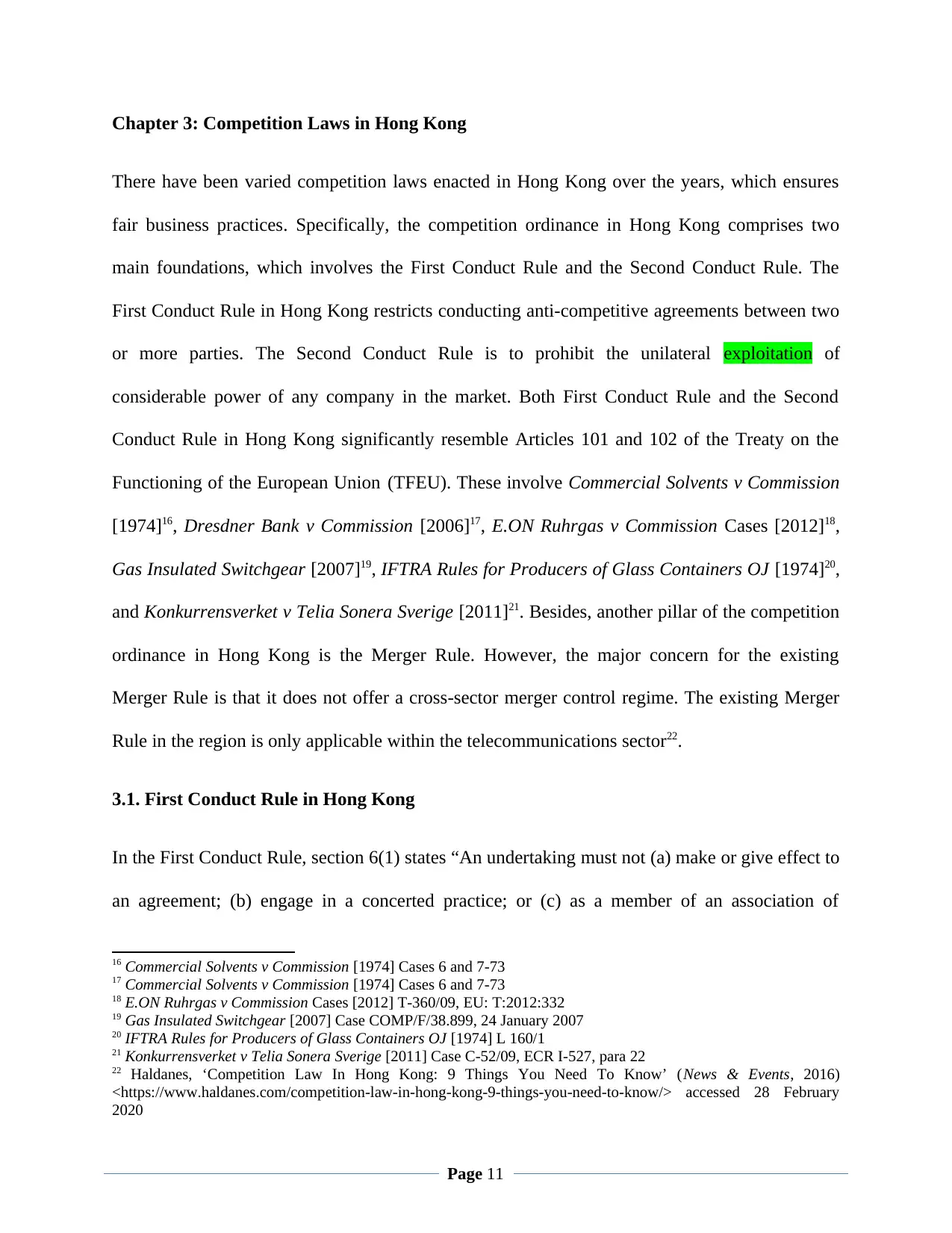
Chapter 3: Competition Laws in Hong Kong
There have been varied competition laws enacted in Hong Kong over the years, which ensures
fair business practices. Specifically, the competition ordinance in Hong Kong comprises two
main foundations, which involves the First Conduct Rule and the Second Conduct Rule. The
First Conduct Rule in Hong Kong restricts conducting anti-competitive agreements between two
or more parties. The Second Conduct Rule is to prohibit the unilateral exploitation of
considerable power of any company in the market. Both First Conduct Rule and the Second
Conduct Rule in Hong Kong significantly resemble Articles 101 and 102 of the Treaty on the
Functioning of the European Union (TFEU). These involve Commercial Solvents v Commission
[1974]16, Dresdner Bank v Commission [2006]17, E.ON Ruhrgas v Commission Cases [2012]18,
Gas Insulated Switchgear [2007]19, IFTRA Rules for Producers of Glass Containers OJ [1974]20,
and Konkurrensverket v Telia Sonera Sverige [2011]21. Besides, another pillar of the competition
ordinance in Hong Kong is the Merger Rule. However, the major concern for the existing
Merger Rule is that it does not offer a cross-sector merger control regime. The existing Merger
Rule in the region is only applicable within the telecommunications sector22.
3.1. First Conduct Rule in Hong Kong
In the First Conduct Rule, section 6(1) states “An undertaking must not (a) make or give effect to
an agreement; (b) engage in a concerted practice; or (c) as a member of an association of
16 Commercial Solvents v Commission [1974] Cases 6 and 7-73
17 Commercial Solvents v Commission [1974] Cases 6 and 7-73
18 E.ON Ruhrgas v Commission Cases [2012] T-360/09, EU: T:2012:332
19 Gas Insulated Switchgear [2007] Case COMP/F/38.899, 24 January 2007
20 IFTRA Rules for Producers of Glass Containers OJ [1974] L 160/1
21 Konkurrensverket v Telia Sonera Sverige [2011] Case C-52/09, ECR I-527, para 22
22 Haldanes, ‘Competition Law In Hong Kong: 9 Things You Need To Know’ (News & Events, 2016)
<https://www.haldanes.com/competition-law-in-hong-kong-9-things-you-need-to-know/> accessed 28 February
2020
Page 11
There have been varied competition laws enacted in Hong Kong over the years, which ensures
fair business practices. Specifically, the competition ordinance in Hong Kong comprises two
main foundations, which involves the First Conduct Rule and the Second Conduct Rule. The
First Conduct Rule in Hong Kong restricts conducting anti-competitive agreements between two
or more parties. The Second Conduct Rule is to prohibit the unilateral exploitation of
considerable power of any company in the market. Both First Conduct Rule and the Second
Conduct Rule in Hong Kong significantly resemble Articles 101 and 102 of the Treaty on the
Functioning of the European Union (TFEU). These involve Commercial Solvents v Commission
[1974]16, Dresdner Bank v Commission [2006]17, E.ON Ruhrgas v Commission Cases [2012]18,
Gas Insulated Switchgear [2007]19, IFTRA Rules for Producers of Glass Containers OJ [1974]20,
and Konkurrensverket v Telia Sonera Sverige [2011]21. Besides, another pillar of the competition
ordinance in Hong Kong is the Merger Rule. However, the major concern for the existing
Merger Rule is that it does not offer a cross-sector merger control regime. The existing Merger
Rule in the region is only applicable within the telecommunications sector22.
3.1. First Conduct Rule in Hong Kong
In the First Conduct Rule, section 6(1) states “An undertaking must not (a) make or give effect to
an agreement; (b) engage in a concerted practice; or (c) as a member of an association of
16 Commercial Solvents v Commission [1974] Cases 6 and 7-73
17 Commercial Solvents v Commission [1974] Cases 6 and 7-73
18 E.ON Ruhrgas v Commission Cases [2012] T-360/09, EU: T:2012:332
19 Gas Insulated Switchgear [2007] Case COMP/F/38.899, 24 January 2007
20 IFTRA Rules for Producers of Glass Containers OJ [1974] L 160/1
21 Konkurrensverket v Telia Sonera Sverige [2011] Case C-52/09, ECR I-527, para 22
22 Haldanes, ‘Competition Law In Hong Kong: 9 Things You Need To Know’ (News & Events, 2016)
<https://www.haldanes.com/competition-law-in-hong-kong-9-things-you-need-to-know/> accessed 28 February
2020
Page 11
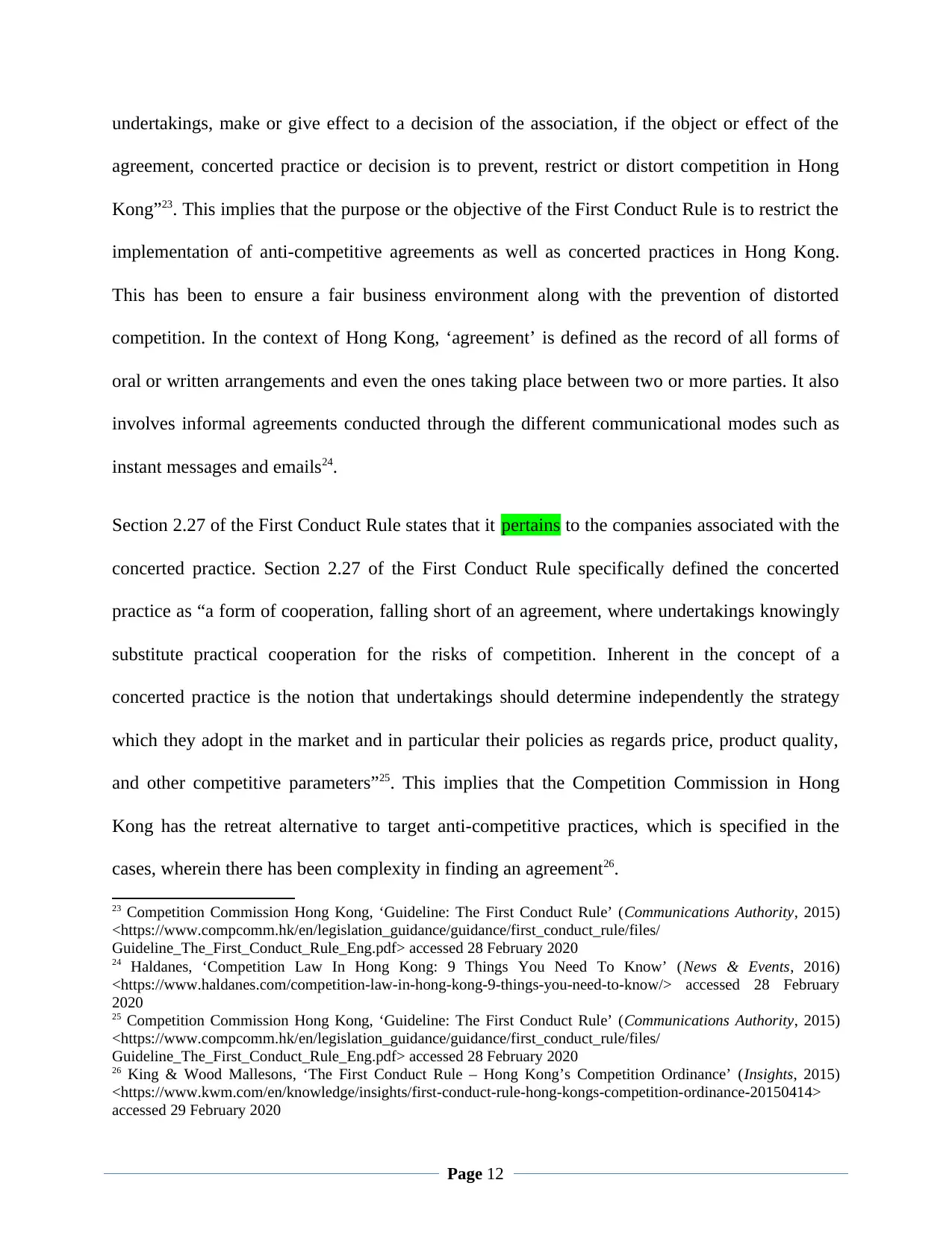
undertakings, make or give effect to a decision of the association, if the object or effect of the
agreement, concerted practice or decision is to prevent, restrict or distort competition in Hong
Kong”23. This implies that the purpose or the objective of the First Conduct Rule is to restrict the
implementation of anti-competitive agreements as well as concerted practices in Hong Kong.
This has been to ensure a fair business environment along with the prevention of distorted
competition. In the context of Hong Kong, ‘agreement’ is defined as the record of all forms of
oral or written arrangements and even the ones taking place between two or more parties. It also
involves informal agreements conducted through the different communicational modes such as
instant messages and emails24.
Section 2.27 of the First Conduct Rule states that it pertains to the companies associated with the
concerted practice. Section 2.27 of the First Conduct Rule specifically defined the concerted
practice as “a form of cooperation, falling short of an agreement, where undertakings knowingly
substitute practical cooperation for the risks of competition. Inherent in the concept of a
concerted practice is the notion that undertakings should determine independently the strategy
which they adopt in the market and in particular their policies as regards price, product quality,
and other competitive parameters”25. This implies that the Competition Commission in Hong
Kong has the retreat alternative to target anti-competitive practices, which is specified in the
cases, wherein there has been complexity in finding an agreement26.
23 Competition Commission Hong Kong, ‘Guideline: The First Conduct Rule’ (Communications Authority, 2015)
<https://www.compcomm.hk/en/legislation_guidance/guidance/first_conduct_rule/files/
Guideline_The_First_Conduct_Rule_Eng.pdf> accessed 28 February 2020
24 Haldanes, ‘Competition Law In Hong Kong: 9 Things You Need To Know’ (News & Events, 2016)
<https://www.haldanes.com/competition-law-in-hong-kong-9-things-you-need-to-know/> accessed 28 February
2020
25 Competition Commission Hong Kong, ‘Guideline: The First Conduct Rule’ (Communications Authority, 2015)
<https://www.compcomm.hk/en/legislation_guidance/guidance/first_conduct_rule/files/
Guideline_The_First_Conduct_Rule_Eng.pdf> accessed 28 February 2020
26 King & Wood Mallesons, ‘The First Conduct Rule – Hong Kong’s Competition Ordinance’ (Insights, 2015)
<https://www.kwm.com/en/knowledge/insights/first-conduct-rule-hong-kongs-competition-ordinance-20150414>
accessed 29 February 2020
Page 12
agreement, concerted practice or decision is to prevent, restrict or distort competition in Hong
Kong”23. This implies that the purpose or the objective of the First Conduct Rule is to restrict the
implementation of anti-competitive agreements as well as concerted practices in Hong Kong.
This has been to ensure a fair business environment along with the prevention of distorted
competition. In the context of Hong Kong, ‘agreement’ is defined as the record of all forms of
oral or written arrangements and even the ones taking place between two or more parties. It also
involves informal agreements conducted through the different communicational modes such as
instant messages and emails24.
Section 2.27 of the First Conduct Rule states that it pertains to the companies associated with the
concerted practice. Section 2.27 of the First Conduct Rule specifically defined the concerted
practice as “a form of cooperation, falling short of an agreement, where undertakings knowingly
substitute practical cooperation for the risks of competition. Inherent in the concept of a
concerted practice is the notion that undertakings should determine independently the strategy
which they adopt in the market and in particular their policies as regards price, product quality,
and other competitive parameters”25. This implies that the Competition Commission in Hong
Kong has the retreat alternative to target anti-competitive practices, which is specified in the
cases, wherein there has been complexity in finding an agreement26.
23 Competition Commission Hong Kong, ‘Guideline: The First Conduct Rule’ (Communications Authority, 2015)
<https://www.compcomm.hk/en/legislation_guidance/guidance/first_conduct_rule/files/
Guideline_The_First_Conduct_Rule_Eng.pdf> accessed 28 February 2020
24 Haldanes, ‘Competition Law In Hong Kong: 9 Things You Need To Know’ (News & Events, 2016)
<https://www.haldanes.com/competition-law-in-hong-kong-9-things-you-need-to-know/> accessed 28 February
2020
25 Competition Commission Hong Kong, ‘Guideline: The First Conduct Rule’ (Communications Authority, 2015)
<https://www.compcomm.hk/en/legislation_guidance/guidance/first_conduct_rule/files/
Guideline_The_First_Conduct_Rule_Eng.pdf> accessed 28 February 2020
26 King & Wood Mallesons, ‘The First Conduct Rule – Hong Kong’s Competition Ordinance’ (Insights, 2015)
<https://www.kwm.com/en/knowledge/insights/first-conduct-rule-hong-kongs-competition-ordinance-20150414>
accessed 29 February 2020
Page 12
⊘ This is a preview!⊘
Do you want full access?
Subscribe today to unlock all pages.

Trusted by 1+ million students worldwide
1 out of 39
Your All-in-One AI-Powered Toolkit for Academic Success.
+13062052269
info@desklib.com
Available 24*7 on WhatsApp / Email
![[object Object]](/_next/static/media/star-bottom.7253800d.svg)
Unlock your academic potential
Copyright © 2020–2025 A2Z Services. All Rights Reserved. Developed and managed by ZUCOL.

